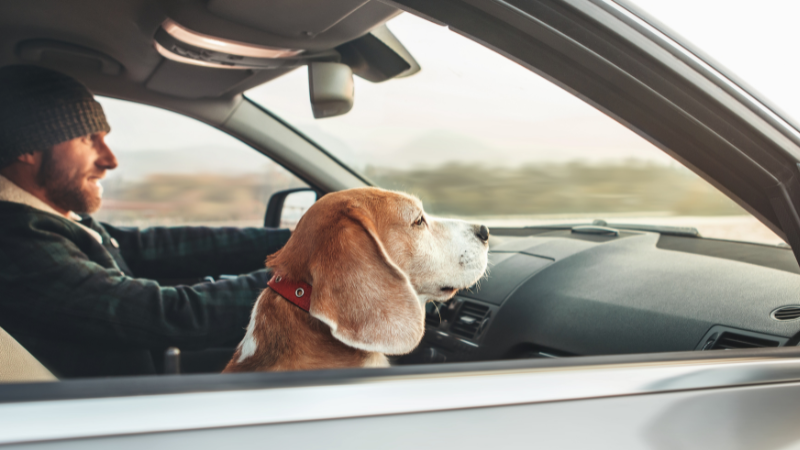.png?lang=en-CA&width=800&height=450&ext=.png&maxsidesize=800&resizemode=force)
The sound of a pet gagging is one we all know too well... Unfortunately, it often seems to happen in the middle of the night, right when they step foot on the carpet, or five minutes into a car ride. No one wants to see their pet sick, or to scrub up the mess. Here are some tips to avoid carsickness in dogs and cats and keep the trips to the dog park, vet clinic, or the cottage as peaceful as possible.
Symptoms of Car Sickness in Pets
Car sickness can look different in each dog or cat. It’s important to determine whether your pet is sick from anxiety, motion, or something entirely different. Here are the most common signs of car sickness in pets to keep an eye out for:
- Drooling
- Lip Licking
- Pacing
- Panting
- Whining
- Shaking
- Vomiting
- Diarrhea
A Slow Introduction
Whether your pet has come home for the first time or is new to driving, a slow and steady introduction to life on four wheels is your best bet. Getting them used to this new environment and motion will help reduce their travel anxiety.
- Hang out with them in the vehicle. Bring some treats. Start the engine. Turn on the radio at a low volume. Give them some ear scratches. Stay in here for 10-20 minutes without actually moving. We want them to feel as comfortable as possible!
- Once they seem at ease with these car visits, try a slow trip around the block. Give them lots of praise and reward them with treats. Do this every day for a week and assess how they’re adjusting.
- Keep increasing the length of your drives together and doing everything possible to make them enjoyable. Avoid slamming on the brakes or cranking the radio volume!
- Cars can be especially stressful for cats, and they should always be in a carrier. Use a seatbelt or specialized strap to keep the carrier in place if possible.
Preventative Tips & Tricks
Some pets can’t overcome their travel anxiety or have unavoidable motion sickness. While they may never make the perfect passenger princess, there are some things we can do to help them out.
- Avoid feeding within a few hours before travel. This will help ease their stomach and hopefully prevent nausea.
- Keep the car cool. A hot car will only add to your pet’s discomfort. Cool AC or even windows down for some fresh air may be comforting.
- Provide fresh water. Like us, when pets are feeling ill, water can help with their discomfort. Consider pulling over to offer your pet water or investing in a water bottle that attaches to their carrier.
- Make it a safe space. Add some toys, blankets, or items of your clothing to bring the scent of home on the road.
Talk to Your Vet
If these tips and tricks don’t seem to be working, consult your vet to find a medication to handle your pet’s car sickness. Depending on your pet’s symptoms, they may suggest one of the following:
- Over-the-counter medications: Your vet may recommend trying a non-prescription remedy before taking further steps. Natural options like ginger, kava, or passionflower can help. There are also medications containing L-Theanine or casein protein derivatives that can help ease car sickness in dogs and cats.
- Nausea medication: If your pet seems to be nauseas without symptoms of anxiety, the vet may recommend something to soothe their stomach. Some examples of these are maropitants, dimenhydrinates, and meclizine.
- Anxiety medication: Some pets’ car sickness stems from anxiety while traveling. In these situations, vets will opt for an anti-anxiety medication. These can include Alprazolam, trazodone, or other prescribed medications that are typically given to the pet prior to travel.
Protecting Your Pet
No one wants to have FOMO – including our favourite family pets. Follow these steps, and hopefully your pet won’t miss out on family outings or trips to the dog park. Consult with your veterinarian about how you can help keep your pet happy and healthy during car rides and beyond. Consider protecting your pet with pet health insurance to avoid the financial stress that comes with vet visits and medications.
At Petsecure, we’ve got them covered with four different coverage options to meet your pet’s specific care needs and your budget. We want you to feel confident saying “yes” to treatment for your pet when it’s needed.
Get your free personalized quote today!
